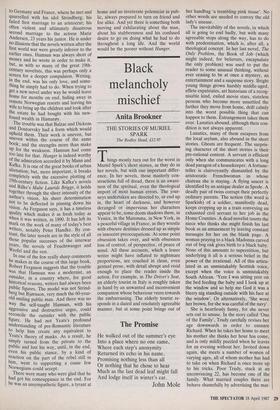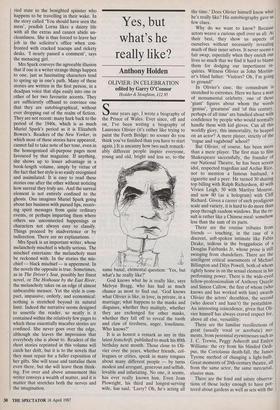Black melancholy mischief
Anita Brookner
THE STORIES OF MURIEL SPARK
The Bodley Head, £12.95
Things mostly turn out for the worst in Muriel Spark's short stories, as they do in her novels, but with one important differ- ence. In her novels, those masterly con- structions full of dread, there is an aware- ness of the spiritual, even the theological import of most human errors. The jour- neys undertaken are directed to, or end up in, the heart of darkness, and however deranged or impervious her characters appear to be, some doom shadows them, in Venice, in the Maremma, in New York, in a peaceful village in France, as they wrestle with obscure destinies dressed up as simple or innocent preoccupations. At some point obsession takes over, and with obsession loss of control, of perspective, of peace of mind. All these accounts, which a lesser writer might have inflated to nightmare proportions, are couched in clean, even genteel prose, with detail abrupt and vivid enough to place the reader inside the action. For example, in The Driver's Seat, an elderly tourist in Italy is roughly taken in hand by an unwanted and inconvenient companion whose behaviour veers towards the embarrassing. The elderly tourist re- sponds in a dazed and resolutely agreeable manner, but at some point brings out of her handbag 'a trembling pink tissue'. No other words are needed to convey the old lady's unease.
The inevitability of the novels, in which all is going to end badly, but with many agreeable stops along the way, has to do with predestination, which is, after all, a theological concept. In her last novel, The Only Problem, the Book of Job • (which might indeed, for believers, encapsulate the only problem) was used to put the reader to some unusual thinking, without ever ceasing to be at once a mystery, an entertainment and a suspense story. Bright young things grown harshly middle-aged, effete expatriates, art historians of a recog- nisable kind, exiled movie stars, stateless persons who become more unsettled the farther they move from home, drift calmly into the worst possible thing that can happen to them. Estrangement takes them over. Lunatics abound, although their con- dition is not always apparent.
Lunatics, many of them escapees from the local asylum, also abound in the short stories. Ghosts are frequent. The surpris- ing character of the short stories is their pre-rational content. A servant is efficient only when she communicates with a long dead paragon of a housekeeper. A fortune- teller is clairvoyantly dismantled by the aristocratic Frenchwoman in whose chateau she is staying. A flying saucer is identified by an antique dealer as Spode. A deadly pair of twins corrupt their perfectly ordinary parents. The notion (the word is Sparkish) of a soldier, manifestly dead, keeps cropping up in a train conveying an exhausted civil servant to her job in the Home Counties. A dead novelist taunts the niece who thinks she might finish his last book as an amusement by leaving constant messages for her on the blank page. A woman praying to a black Madonna carved out of bog oak gives birth to a black baby. None of this amounts to superstition, but underlying it all is a serious belief in the power of the irrational. All of this articu- lated in an unmistakably Scottish voice, except when the voice is unmistakably South African. `Yere I was sitting yere on the bed feeding the baby and I look up at the window and so help me God it was a blerry nig standing outside with his face at the window'. Or alternatively, 'She wore her brown, for she was careful of the navy'.
She is heartlessly funny, for she never sets out to amuse. In the story called 'One of the Family', Trudy carefully revises her age downwards in order to ensnare Richard. When he takes her home to meet his mother she thinks her hour has come, and is only mildly puzzled when he leaves for an evening without her. Invited down again, she meets a number of women of varying ages, all of whom mother has had to take on when Richard is once more up to his tricks. Poor Trudy, stuck at an unconvincing 22, has become one of the family. What married couples there are behave shamefully by advertising the mar- ried state to the benighted spinster who happens to be travelling in their wake. In the story called 'You should have seen the mess', prudish Lorna likes a dainty life with all the extras and cannot abide un- cleanliness. She is thus forced to leave her job in the solicitor's office when con- fronted with cracked teacups and rickety desks. 'I nearly passed a comment', says the menacing girl.
Mrs Spark conveys the agreeable illusion that if one is a writer strange things happen to one, just as fascinating characters tend to spring up in one's path. Many of these stories are written in the first person, in a deadpan voice that slips easily into one or other of her two favourite accents. They are sufficiently offhand to convince one that they are autobiographical, without ever dropping out of the realm of fiction. They are not recent: many hark back to the period of the 1940s, which is as much Muriel Spark's period as it is Elizabeth Bowen's. Readers of the New Yorker, in which most of these stories have appeared, cannot fail to take note of her tone, even in the homogenised all-purpose pages most favoured by that magazine. If anything, she shows up to lesser advantage in a book-length volume, simply by virtue of the fact that her style is so easily recognised and assimilated. It is easy to read these stories one after the other without noticing how surreal they truly are. And the surreal element is not entirely confined to the ghosts. One imagines Muriel Spark going about her business with pursed lips, receiv- ing spirit messages from quite ordinary events, or perhaps imparting them where others see unconnected happenings or characters not always easy to classify. Things proceed by inadvertence or by indirection. There are no explanations.
Mrs Spark is an important writer, whose melancholy mischief is wholly serious. The mischief entertains: the melancholy must be reckoned with. In the stories the mis- chief — black mischief — is uppermost. In the novels the opposite is true. Sometimes, as in The Driver's Seat, possibly her finest novel, or The Hothouse by the East River, the melancholy takes on an edge of almost unbearable menace. Yet the style is com- pact, impassive, orderly, and economical: nothing is stretched beyond its natural limit. Indeed the narrative seems designed to unsettle the reader, so neatly is it contained within the relatively few pages to which these essentially macabre stories are confined. She never goes over the edge, although she leaves the impression that everybody else is about to. Readers of the short stories reprinted in this volume will catch her drift, but it is to the novels that they must repair for a fuller exposition of her gifts. She will tease and tantalise them even there, but she will leave them think- ing. For over and above amusement this writer conveys a wealth of matter, and it is matter that stretches both the nerves and the imagination.



















































 Previous page
Previous page